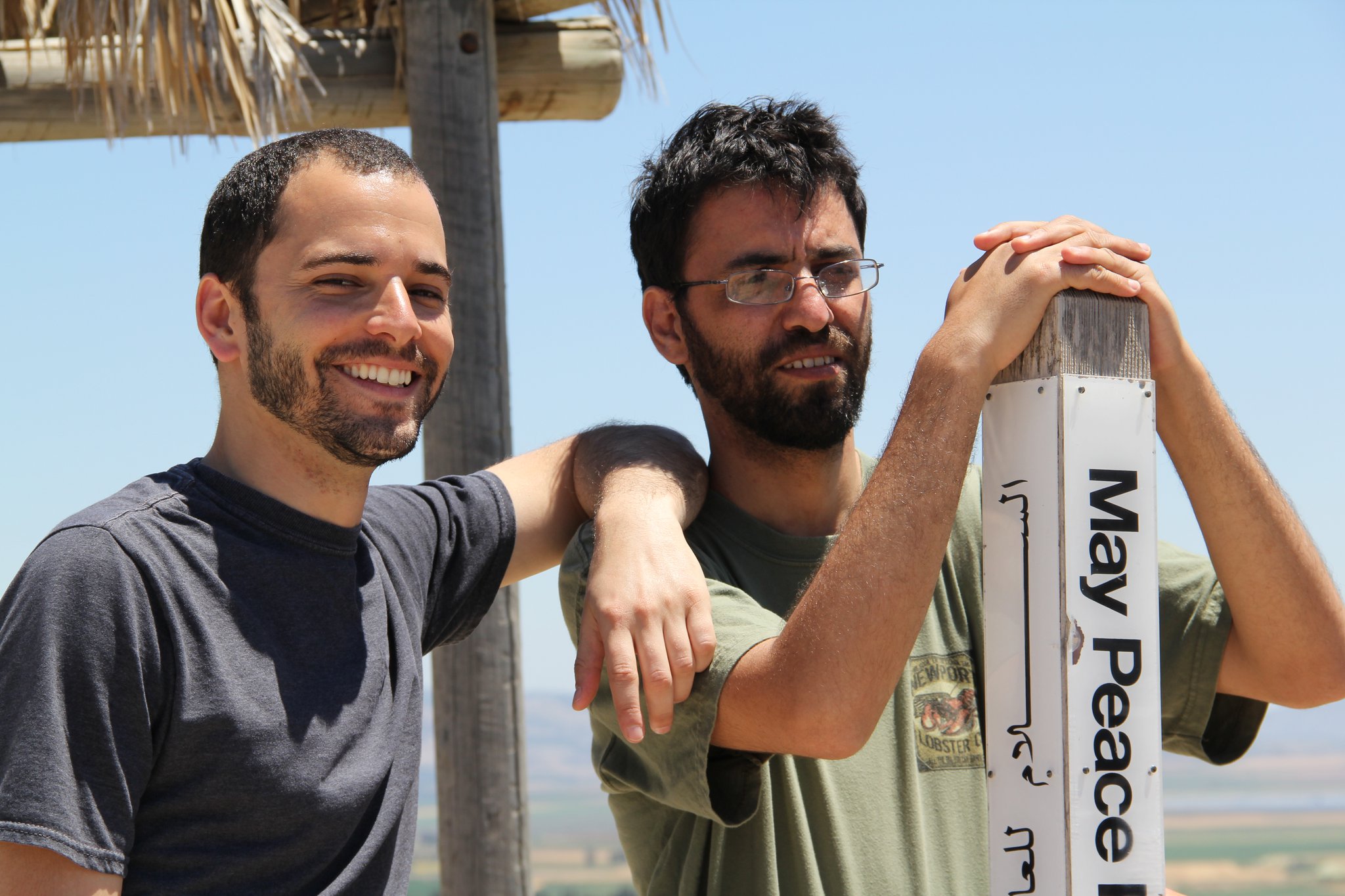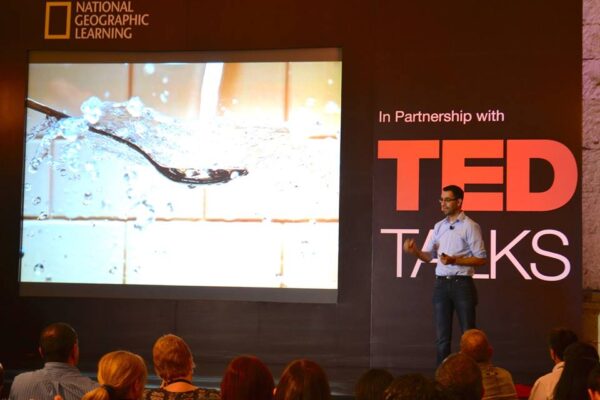
07 May Mountainfilm: Presenter Aziz Abu Sarah – Tourism for Peace, In-Person & Online at 2021 Event!
Mountainfilm plans to once again bring films from Telluride, home base, to couches and camper vans around the world in 2021. Passes to the online festival, which will run May 31–June 6, are now available at Mountainfilm.org.
In addition to the seven-day Mountainfilm Online festival offering access to a robust Mountainfilm 2021 lineup from the comfort and safety of home, with Covid restrictions lifted, the nonprofit is planning more in-person screenings and programs in Telluride over Memorial Day weekend, May 28–31.
Among the featured speakers at Mountainfilm 2021, for both the virtual and in-person events in Telluride, is Aziz Abu Sarah, a Palestinian peace activist, entrepreneur, cultural educator, politician and author, also a National Geographic Explorer and TED Fellow.
Aziz is co-founder of Mejdi Tours, a full-service tour company that operates in conflict zones.
His subject at Mountainfilm is also the subject of Aziz’s latest book: “Crossing Boundaries: A Traveler’s Guide to World Peace,” a vision of a kind of travel with the power to help heal the divides of a world polarized by seemingly intractable conflicts.
Scroll down to listen to Aziz’s podcast:

We have learned to fly the air like birds and swim the sea like fish, but we have not learned the simple art of living together as brothers,” Martin Luther King.
The concept of “Otherism” or “Not Me” is centuries old. It is an “Us vs. Them” way of thinking about human connections and relationships. “Othering” is a way of negating another person’s individual humanity and, consequently, those that are have been Othered are seen as less worthy of respect. On a larger scale, the idea also plays a role in the dehumanization of entire groups of people who can then be exploited to drive changes in institutions, governments, and societies.”Otherism” can lead to the persecution of marginalized groups, the denial of rights based on group identities, even acts of violence. Sound all too familiar?

Aziz and Shira Nesher guiding om a bus on a tour .
“Othering” in all its pernicious incarnations has been making headlines in America for decades – think Irish, Germans and Italians in the 19th and early 20th century; Chinese Exclusion Act of 1882; Japanese post Pearl Harbor; Muslims post 9/11; black Americans since the days of slavery, etc – with the concept gaining new momentum since the election of 2016.
Arguably “Othering” is one of the biggest challenges of the 21st Century. Virtually every global, national, and regional conflict is wrapped within or organized around one or more dimensions of group-based differences. “Othering” underlies territorial disputes, sectarian violence, military conflict, the spread of disease, hunger and food insecurity, even climate change.
One antidote to “Othering”: tourism.

A tour in Petra Jordan. The camel stole a traveler’s soda.
According to irantourismnews.com
“Tourism has been hailed as ‘the global peace industry,’ and, as is frequently implied, there is a natural link between tourism and peace. In 1929, for instance, the British Travel and Holidays Association declared ‘Travel for Peace’ as the theme of its inaugural meeting. In 1967, the UN’s International Tourism Year adopted as its slogan, ‘Tourism: Passport to Peace.’ In 1986, the International Institute for Peace through Tourism (IITP) was founded, and two years later organized its first global conference entitled ‘Tourism: A Vital Force for Peace.’ And, at the 2008 Travelers Philanthropy Conference in Tanzania, Nobel Laureate and founder of the Green Belt Movement in Kenya, Wangari Maathai, declared in her keynote address, ‘Tourism can be a great vehicle for peace promotion.’ While tourism and peace have often been linked, the connection is not guaranteed…creating the connection between tourism and peace requires conditions on both sides of the equation be right: peace must be more than an absence of conflict, and tourism must be crafted so that it truly benefits local communities and the environment.”
Welcome to the world of Aziz Abu Sarah, co-founder and co-CEO (with Scott Cooper, a Jewish man from Indiana)) of Mejdi Tours

Aziz leading a tour at the Golan Heights showing the distance from other cities in the Middle East.
Mejdi is a full-service tour company that has operated excursions since 2013 in Israel and the Palestinian Authority, Ireland and Northern Ireland, Jordan, Turkey, Iraqi Kurdistan, Spain, and Egypt, among other destinations with the goal of exposing tourists to new and often surprising perspectives in age-old conflict areas through “dual narratives” by tour guides who are willing and able to share both sides of the story.

Azoz co-guiding with my friend Kobi Skolnick in Megiddo.
Aziz and Scott believe that allowing people to tell their stories is a first step towards fostering peace and cultural understanding.
Aziz has spoken at countless of international organizations and universities, including The United Nations, Nexus, TED, BMW, European Parliament, Georgetown, Yale and Harvard. He has published articles in The New York Times, National Geographic, TED, Haaretz, Jerusalem Post and does regular analysis for CNN, Fox, and Aljazeera among others news outlets.

A man claiming the date tree at a farm in Oman Jordan.

Nat Geo expedition, meeting a rabbi.
Aziz Abu Sarah is the recipient of the Goldberg Prize for Peace in the Middle East from the Institute of International Education; the European Parliament’s Silver Rose Award; the Eisenhower Medallion; and the Eliav-Sartawi Award for his Middle Eastern Journalism. He was named one of the “500 Most Influential Muslims in the World” by the Royal Strategic Centre in Jordan in 2010, 2011, 2012, 2013, and 2014.
“If more of the world’s 1 billion tourists were to engage with real people living real lives, argues Aziz, “it would be a powerful force for shattering stereotypes and promoting understanding, friendship and peace.”
The alchemy of transforming hate into love – or at least into like and better understanding – came from tough life lessons.

Aziz and his older brother Tayseer who was killed at 18 due to beating sustained in Israeli prison.
When Aziz was a boy of 10, his older brother was arrested on charges of throwing stones. Tayseer was taken to prison and beaten, ultimately dying of his injuries. Aziz subsequently grew up angry, bitter and seeking revenge. Then later in life he met, for the first time, Jews who were not toting guns, regular folks, not soldiers. And he had an epiphany: Not only did they share his love of small things, namely coffee, country music, and food, but also coming face to face with the “enemy” compelled Aziz to find ways to overcome hatred, anger and fear.
“Funny as it might sound, it was painful to make these new friends. Coming to terms with my own demonization of Jews was harrowing. I was stunned at how it had allowed me to disregard people’s common humanity. We weren’t so different after all. I knew now I couldn’t let those who murdered Tayseer drown me in blind hatred and anger. I could choose whether to respond with hatred and violence, or with grace and love. Tentatively, I began choosing to respond with love…,” explained Aziz in a previous interview.
Mountainfilm regular and internationally renowned writer/philosopher Pico Iyer sums up Aziz’s mission and the goal of Mejdi Tours best: “You look at the statistics, you despair. You look at the faces and you get hope.”
For more (and a preview of Aziz’s Mountainfilm talk), listen to his podcast.


Sorry, the comment form is closed at this time.